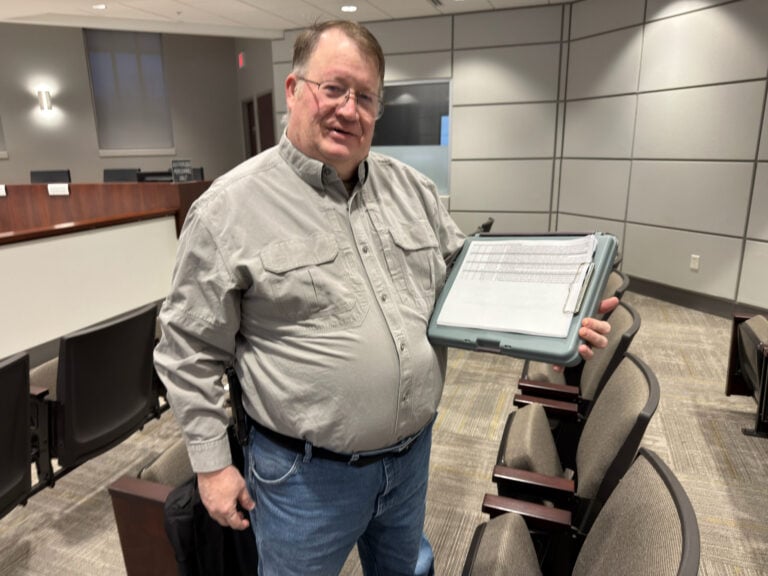By Patricia A. Scheyer
NKyTribune reporter
Erlanger mayor Jessica Fette brought up a subject at the Kenton County Mayor’s group Saturday morning that she said the area leaders need to know about, because it is headed straight for them.
Last year, Kentucky Governor Andy Beshear saw that House Bill 136, which would have allowed a path for medical marijuana in the state, was not going to get through the senate, although it had passed the house.
On June 14, 2022, Beshear issued an executive order forming the Kentucky Medical Cannabis Advisory Committee to find ways to move medical cannabis forward in the state.

This year Governor Beshear asked the legislature to create a legislatively authorized medical program, since he had created the committee in 2022, so Senate Bill 47 was created. It was the first time a legalization bill had received a state senate hearing. The bill was approved 26 to 11 on March 16 and the house held a first reading on the same day. The bill was passed by the house on March 30 and was signed by the governor on March 31 of this year.
“The state has legalized, as of January 1, 2025, medicinal cannabis,” said Fette. “It is very, very governed by the state as to who can provide, who can grow, that will be handled at the state level. Any doctor that wants to be able to prescribe medicinal cannabis will have to go through a certification process to become a medicinal cannabis practitioner, and then they will be able to operate a medicinal cannabis business in your state, given you permit it. The state has pushed who can permit it down to the local government. So whether the county or the city, and our decisions as a city are completely independent of the county. The county can prohibit it, but you and your city can allow it, or vice versa. It is coming in your direction. It is only a matter of time before someone asks you about this.”
She felt that the issue can be approached in one of three ways: first, it could be pushed to be put on the ballot in November of 2024, for it to be a voter referendum; secondly, an ordinance could be passed that prohibits it completely; and third, an ordinance could be passed that regulates the times a business can operate and the location of the business. She said cities can decide where they want to locate the businesses.
Fette said she talked to JD Chaney of the Kentucky League of Cities, and he said it is up to the city to address all forms and all aspects of the business, such as who can grow it, and who can dispense it. It is not already included in the zones in PDS, so it is up to the cities and the counties how they want to word the zoning for these businesses. It can be put in agricultural or retail, but all of the stages of medicinal cannabis have to be in the zoning somewhere. She found out that there is a regulatory fee that can be charged, as with alcohol, but it cannot be a tax.

“You can’t say I’m only going to let them grow, I’m not going to let them dispense, or I’m going to let them dispense, not going to let them grow,” she explained. “You have to have all the stages of medicinal cannabis in your zoning in some way.”
She said she brought it up because she would rather get out in front of the issue, rather than not be prepared for it. She encouraged everyone in the room to read the bill and find out what it is all about. After talking to Chaney, he told her that out of all the states, this law is extremely well written, taking into consideration all the failings of laws in other states, which should provide less cause for concern and hope for success.
“There is a very specific list of illnesses that this can be prescribed for, so this is not recreational cannabis, it is for PTSD, epilepsy, chronic pain, and all cancer stages,” Fette said. “I know some people would rather not take a lead on this one, it’s going to be a like a political hot potato.”
She advised the mayors to talk to their council about the issue, because a business owner who is a medical provider in Erlanger brought the issue to Fette, and they would like to have medicinal cannabis in their toolbox to help their patients.
Edgewood Mayor John Link suggested that there should be someone who is knowledgeable about the subject who could visit all the cities and talk to the council or commission about the new law.
Fette thought that was a good idea.
She did say that she wanted to bring it up at the Mayors’ meeting because she believes that if all the cities in NKY are going to allow it they ought to see if they can be on the same page.
“Let’s not create a different — you know, you go to Covington, and it’s one batch of rules, you go to Independence and it’s one batch of rules,” Fette explained. “If you’re going to allow it, lets get together and lets figure out an ordinance that can work for all of us, and be consistent. Obviously, if you’re going to prohibit it, okay that’s fine, that’s your prerogative, but if your city is interested let’s have a small working group with your attorney, and figure out how to do it right, and set a model.”
As far as setting the zoning, Josh Wice was at the meeting representing PDS, and he said the good thing is the state has established a very specific definition around the issue, and that helps because it is like having Zoning 101. He said the cabinet has to have state regulations by July first of 2024. He reminded the cities that the zoning ordinances will belong to the cities.
Fette said that Chaney was very proud of the law because it gives the cities and counties a lot of home rule, and Wice agreed, saying that it has teeth, and gives a lot of local control. Fette again brought up forming a small group so that people can be on the same page.
“I don’t think this is going to go away,” she said.

















